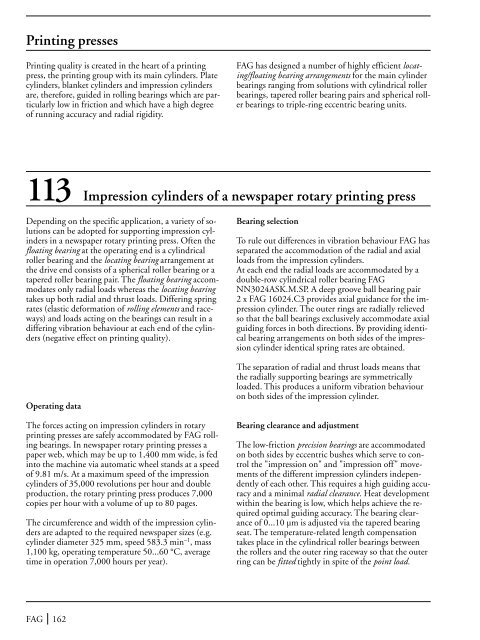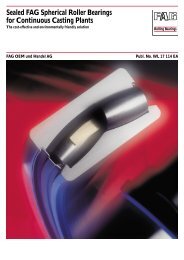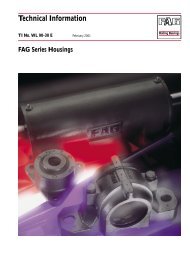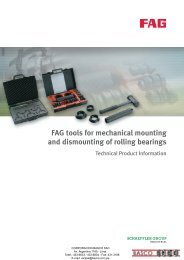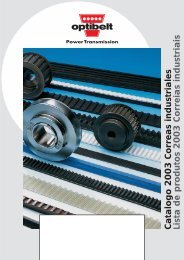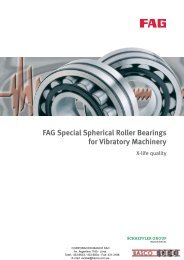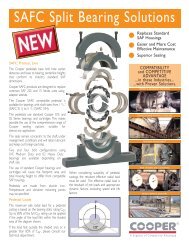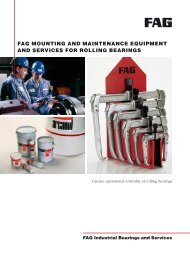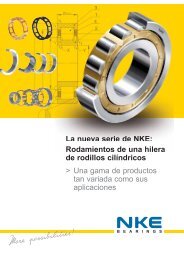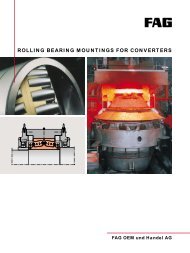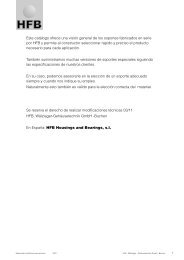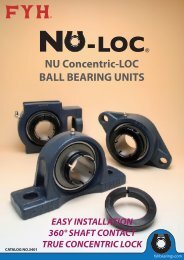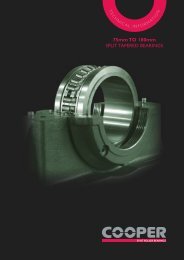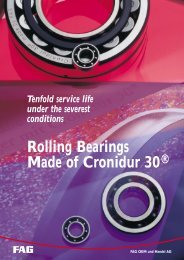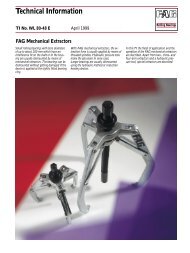Create successful ePaper yourself
Turn your PDF publications into a flip-book with our unique Google optimized e-Paper software.
Printing pressesPrinting quality is created in the heart <strong>of</strong> a printingpress, the printing group with its main cylinders. Platecylinders, blanket cylinders and impression cylindersare, therefore, guided in rolling bearings which are particularlylow in friction and which have a high degree<strong>of</strong> running accuracy and radial rigidity.FAG has designed a number <strong>of</strong> highly efficient locating/floatingbearing arrangements for the main cylinderbearings ranging from solutions with cylindrical rollerbearings, tapered roller bearing pairs and spherical rollerbearings to triple-ring eccentric bearing units.113 Impression cylinders <strong>of</strong> a newspaper rotary printing pressDepending on the specific application, a variety <strong>of</strong> solutionscan be adopted for supporting impression cylindersin a newspaper rotary printing press. Often thefloating bearing at the operating end is a cylindricalroller bearing and the locating bearing arrangement atthe drive end consists <strong>of</strong> a spherical roller bearing or atapered roller bearing pair. <strong>The</strong> floating bearing accommodatesonly radial loads whereas the locating bearingtakes up both radial and thrust loads. Differing springrates (elastic deformation <strong>of</strong> rolling elements and raceways)and loads acting on the bearings can result in adiffering vibration behaviour at each end <strong>of</strong> the cylinders(negative effect on printing quality).Operating data<strong>The</strong> forces acting on impression cylinders in rotaryprinting presses are safely accommodated by FAG rollingbearings. In newspaper rotary printing presses apaper web, which may be up to 1,400 mm wide, is fedinto the machine via automatic wheel stands at a speed<strong>of</strong> 9.81 m/s. At a maximum speed <strong>of</strong> the impressioncylinders <strong>of</strong> 35,000 revolutions per hour and doubleproduction, the rotary printing press produces 7,000copies per hour with a volume <strong>of</strong> up to 80 pages.<strong>The</strong> circumference and width <strong>of</strong> the impression cylindersare adapted to the required newspaper sizes (e.g.cylinder diameter 325 mm, speed 583.3 min –1 , mass1,100 kg, operating temperature 50...60 °C, averagetime in operation 7,000 hours per year).<strong>Bearing</strong> selectionTo rule out differences in vibration behaviour FAG hasseparated the accommodation <strong>of</strong> the radial and axialloads from the impression cylinders.At each end the radial loads are accommodated by adouble-row cylindrical roller bearing FAGNN3024ASK.M.SP. A deep groove ball bearing pair2 x FAG 16024.C3 provides axial guidance for the impressioncylinder. <strong>The</strong> outer rings are radially relievedso that the ball bearings exclusively accommodate axialguiding forces in both directions. By providing identicalbearing arrangements on both sides <strong>of</strong> the impressioncylinder identical spring rates are obtained.<strong>The</strong> separation <strong>of</strong> radial and thrust loads means thatthe radially supporting bearings are symmetricallyloaded. This produces a uniform vibration behaviouron both sides <strong>of</strong> the impression cylinder.<strong>Bearing</strong> clearance and adjustment<strong>The</strong> low-friction precision bearings are accommodatedon both sides by eccentric bushes which serve to controlthe "impression on" and "impression <strong>of</strong>f" movements<strong>of</strong> the different impression cylinders independently<strong>of</strong> each other. This requires a high guiding accuracyand a minimal radial clearance. Heat developmentwithin the bearing is low, which helps achieve the requiredoptimal guiding accuracy. <strong>The</strong> bearing clearance<strong>of</strong> 0...10 µm is adjusted via the tapered bearingseat. <strong>The</strong> temperature-related length compensationtakes place in the cylindrical roller bearings betweenthe rollers and the outer ring raceway so that the outerring can be fitted tightly in spite <strong>of</strong> the point load.FAG 162


